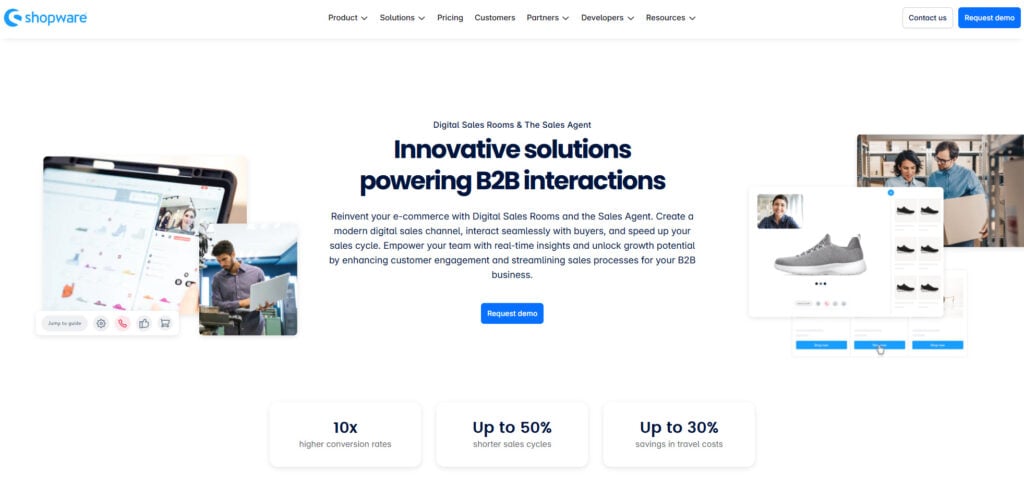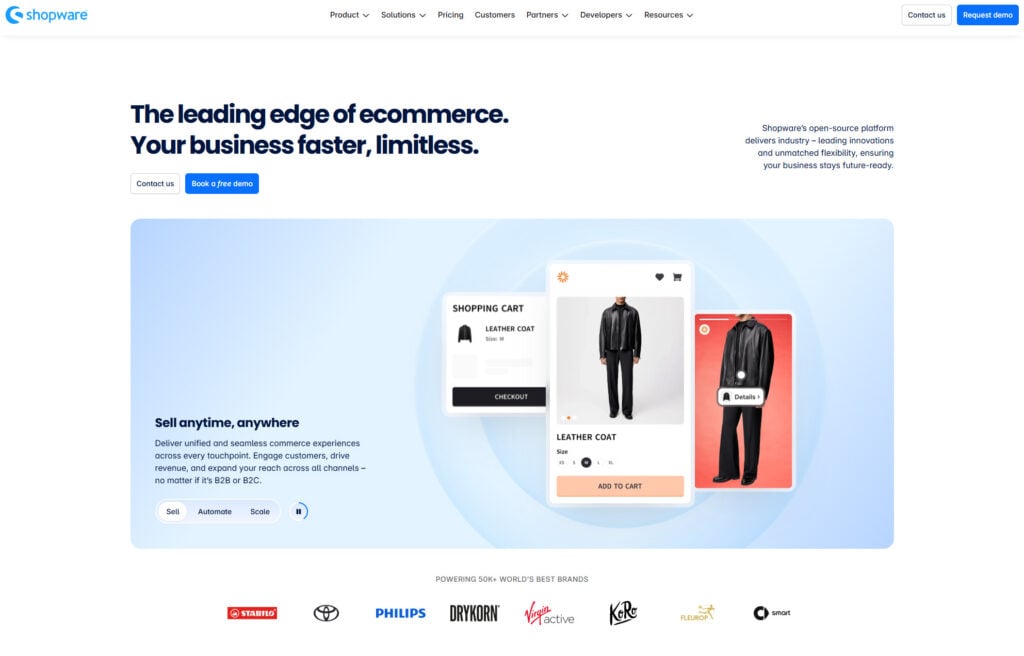Shopware is a popular eCommerce platform due to its flexibility and innovative features. Shopware is built on a modular, open-source architecture that allows businesses to choose the specific functionality they need and easily scale. It integrates with third-party applications and has a robust ecosystem of plugins and extensions, giving businesses a seamlessly connected management experience. However, Shopware users have reported some downsides to the platform, including technical complexity, a high cost for some features, and a dependence on third-party solutions for some functionality. In this post, the eCommerce experts at Atwix analyze the pros and cons of Shopware to help you decide if it’s the right platform for your business.
The Pros and Cons of Shopware
| Pros | Cons |
| ✔ Flexibility and Customization ✔ Intuitive Cloud Interface ✔ Highly Scalable ✔ SEO and Marketing Tools ✔ Omnichannel Sales ✔ Headless Commerce ✔ Optimized for Mobile | ✘High Cost for Some Features ✘Technical Complexity for Self-Hosted ✘Dependence on Third-Party Solutions |
Pro: Flexibility and Customization
Shopware is very flexible, offering both self-hosted and cloud-based Platform-as-a-Service (PaaS) versions of the software. It also allows businesses to customize the platform’s features and capabilities through rule sets, plugins, and other configuration options. Its API-first design also enables seamless integrations with third-party solutions, so you can further tailor Shopware’s functionality to meet your specific requirements.
Pro: Intuitive Cloud Interface
Shopware’s cloud version is easy to set up and offers an intuitive, user-friendly interface that anyone can use, even those with limited technical knowledge. It’s possible to configure a Shopware site with little to no HTML, and integrating third-party apps is similarly easy.
Pro: Highly Scalable
The cloud version of Shopware easily scales with the needs of your business, so you never have to worry about sudden spikes in demand crashing your eCommerce store. Shopware also offers multiple pricing plans, so you can save money during lean periods or upgrade your capabilities as your business grows.
Pro: SEO and Marketing Tools
Shopware offers basic SEO and marketing tools, similar to other eCommerce platforms. Businesses can configure SEO-friendly URLs for product and category pages, rebuild SEO indexes, set canonical URLs, and define URL forwarding behavior, all of which help maintain visibility in search engines. Shopware also has two built-in marketing features: the ability to manage newsletter recipients and a tool to create discounts, promo codes, loyalty programs, and other promotions.
Pro: Omnichannel Sales
Shopware gives businesses a centralized platform to manage and control multiple sales channels, maximizing efficiency. This functionality lets you optimize sales operations across various touch points and ensures no opportunities are left on the table.
Pro: Headless Commerce
Shopware enables the “headless commerce” approach to eCommerce, which separates the presentation layer (what your customers see) from the backend. This lets you easily add and modify content like product descriptions without needing to mess with any HTML or other coding.
Pro: Optimized for Mobile
Shopware automatically optimizes your eCommerce site for mobile, ensuring your customers get an attractive, user-friendly experience no matter how they access your store.

Con: High Cost for Some Features
Shopware offers a wide range of features, including AI functionality, but not everything is available with the basic version of the software. Upgraded versions of the platform can get pricey, especially when you factor in the cost of third-party apps and plugins.
Con: Technical Complexity (for Self-Hosted)
While the cloud version of Shopware is relatively easy to set up, the same cannot be said for the self-hosted version. Implementing Shopware on your own servers and managing your own databases requires some technical know-how.
Con: Dependence on Third-Party Solutions
While one of Shopware’s strengths is its ability to easily integrate with third-party software, the platform is fairly dependent on these integrations to offer the full range of functionality you might need for your store. These dependencies create complexity, introduce potential security risks, and drive up the cost of the software.

Is Shopware Right for You?
Shopware is a robust eCommerce platform with many exciting capabilities, including its new AI features. Upgraded versions of Shopware offer expanded B2B features, customer-specific pricing, the ability to manage multiple warehouses, and other advanced functionality. The cloud version of the software is especially easy to set up and use, and can easily scale to meet your needs. However, the base version of the software often requires third-party integrations and plugins to get all the necessary functionality, which drives up the cost and complexity. These factors make Shopware – particularly the cloud version – a good solution for businesses that need an easy-to-use platform that interoperates with their existing software and can be customized to their exact needs.
Need More Help Choosing a Solution?
The Atwix team has the expertise to analyze your eCommerce needs and recommend the right platform for your business. We’ll help you weigh the pros and cons of Shopware and decide if it offers the best combination of pricing, features, and support for your specific requirements. We can also help you implement, customize, integrate, and optimize your chosen eCommerce solution to maximize your chances of success.
Reach out to Atwix to schedule your Shopware consultation.
